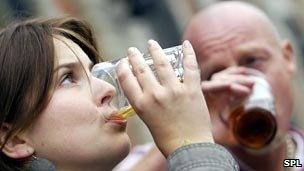'Tipsy' alcohol gene 'could help curb alcoholism'
- Published

Experts say they have found a "tipsy" gene that explains why some people feel alcohol's effects quicker than others.
The US researchers believe 10% to 20% of people have a version of the gene that may offer some protection against alcoholism.
That is because people who react strongly to alcohol are less likely to become addicted, studies show.
The University of North Carolina said the study aims to help fight addiction, not pave the way for a cheap night out.
Ultimately, people could be given CYP2E1-like drugs to make them more sensitive to alcohol - not to get them drunk more quickly, but to put them off drinking to inebriation, the Alcoholism: Clinical and Experimental Research journal reported.
Straight to the head
Lead researcher Professor Kirk Wilhelmsen said: "Obviously we are a long way off having a treatment, but the gene we have found tells us a lot about how alcohol affects the brain."
Most of the alcohol people consume is broken down in the liver, but some is metabolised in the brain by an enzyme which the CYP2E1 gene provides coded instructions for.
People who have the "tipsy" version of CYP2E1 break down alcohol more readily, which explains why they feel the effects of alcohol much quicker than others.
The researchers made their discovery by studying more than 200 pairs of students who were siblings and who had one alcohol-dependent parent but who did not have a drink problem themselves.
They gave the students a mixture of grain alcohol and soda that was equivalent to about three average alcoholic drinks. At regular intervals the students were then asked whether they felt drunk, sober, sleepy or awake.
The researchers then compared the findings with gene test results from the students.
This revealed that CYP2E1 on chromosome 10 appears to dictate whether a person can hold their drink better than others.
Professor Wilhelmsen says more research is now needed to see if the findings could be used to make new treatments to tackle alcohol addiction.
"Alcoholism is a very complex disease, and there are lots of complicated reasons why people drink. This may be just one of the reasons," he added.
Don Shenker, of the charity Alcohol Concern, said that, in most cases, alcohol abuse stemmed from social problems, with alcohol used as a prop.
Professor Colin Drummond, an expert in addiction at London's Institute of Psychiatry, said it was likely to be combination of genes and environment.
"It is well recognised that alcohol dependence runs in families," he said.
He said research suggests having an alcoholic parent quadruples a person's risk of developing a drinking problem.
- Published19 November 2009
- Published16 May 2005
- Published13 April 2010